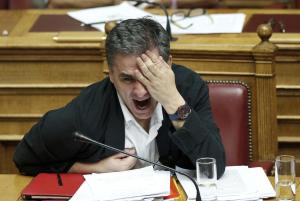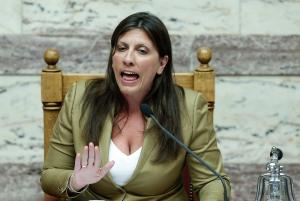Greece’s euro partners approve billions in new loans
15
Aug
Greece’s euro partners approve billions in new loans
View gallery
-
.
-
.
-
.
-
.
BRUSSELS (AP) — Finance ministers of the 19-nation euro single currency group on Friday approved the first 26 billion euros ($29 billion) of a vast new bailout package to help rebuild Greece’s shattered economy.
The approval came after Greece’s parliament passed a slew of painful reforms and spending cuts after a marathon overnight session that divided the governing party, raising the specter of early elections.
“Of course there were differences but we have managed to solve the last issues,” Eurogroup chairman Jeroen Djisselbloem told reporters in Brussels. “All the intense work of the past week has paid off.”
Ten billion euros will be available to recapitalize Greece banks, while a second slice of 16 billion euros will be paid in installments, starting with 13 billion euros by Aug. 20 when Greece must make a new debt payment to the European Central Bank.
“On this basis, Greece is and will irreversibly remain a member of the Euro area,” said European Commission President Jean-Claude Juncker after the deal was sealed.
The final rescue package would eventually give Greece up to 86 billion euros ($93 billion) in loans over three years in exchange for harsh spending cuts and tax hikes.
View gallery
Dutch Finance Minister and chairman of the eurogroup Jeroen Dijsselbloem, left, shakes hands with Gr …
The deal must still be approved by some national parliaments, including Germany, but that is largely considered to be a formality. Some nations, such as Finland, have already given their approval.
The move saves Greece from a disorderly default on its debts which could have come as soon as next week and helps end months of uncertainty that has shaken world markets, but it means more hardship for ordinary Greeks.
Greece’s most influential creditor and perhaps its harshest critic welcomed the agreement as “a good result.”
“We must nonetheless remain cautious because of course we are providing huge sums of money,” German Finance Minister Wolfgang Schaeuble said.
“If the Greeks don’t want this program, it won’t work,” he told ZDF television. “But that’s why we are only paying out step by step and making sure that we don’t make the risks greater than is inevitable if we want to help Greece.”
View gallery
Greek Finance Minister Euclid Tsakalotos gestures during a parliamentary session in Athens, early Fr …
A key sticking point has been whether to forgive some of Greece’s debts.
The International Monetary Fund has insisted that Greece must be given some form of debt relief before it will participate in any new bailout, but a number of the country’s euro partners oppose such a move.
“It is equally critical for medium and long-term debt sustainability that Greece’s European partners make concrete commitments … to provide significant debt relief, well beyond what has been considered so far,” IMF chief Christine Lagarde said in a statement.
Keen to have the IMF on board, the finance ministers said the eurogroup “stands ready to consider, if necessary, possible additional measures” such as longer grace and repayment periods.
But this would only take place in October, once a review has been made of whether Greece is fully respecting the bailout terms.
View gallery
Greek Prime Minister Alexis Tsipras looks on during a parliamentary session in Athens, Friday, Aug. …
The bailout bill passed through the Greek parliament thanks to support from opposition parties, with 222 votes in favor, 64 against, 11 abstentions and three absent in the 300-member parliament.
Although approved by a comfortable majority, the result was a blow to Prime Minister Alexis Tsipras, who saw more than 40 of his 149 radical left Syriza party lawmakers vote against him. He has come under intense criticism from party hardliners for capitulating to the creditors’ demands for budget cuts – austerity measures he had promised to oppose when he won elections in January.
The bill includes reforms increasing personal, company and shipping taxes, reducing some pensions, abolishing tax breaks for some groups considered vulnerable and implementing deep spending cuts, including to the armed forces.
State television said Tsipras was expected to call a vote of confidence in his government, but that was not confirmed. Government spokeswoman Olga Gerovasili said any action would come after Aug. 20.
Tsipras has maintained his public popularity in Greece despite his U-turn on austerity policies, and consistently leads opposition parties in opinion polls. An election would allow him to remove the hard line elements from his party, but it is not a risk-free option.
View gallery
Speaker of Parliament Zoe Konstantopoulou speaks to lawmakers during a debate in Athens, early Frida …
“An election in the next few months would create more political uncertainty, delay economic recovery and impede reform implementation and the possibility of opening talks on debt relief as desired by the (International Monetary Fund) as a condition of its involvement in funding the program,” said Joan Hoey, analyst for Europe at the Economist Intelligence Unit.
“However, it appears to be unavoidable if Greece is to have a government capable of implementing the agreement.”
Syriza dissenters angrily challenged the government during the all-night parliamentary session.
“I feel ashamed for you. We no longer have a democracy … but a eurozone dictatorship,” prominent party member and former energy minister Panagiotis Lafazanis said before the vote. Lafazanis signed a declaration with another 12 left-wing politicians Thursday saying they would start a new anti-austerity movement. He stopped short of quitting Syriza.
The terms of the new bailout were agreed earlier this week with creditor negotiators from the European Central Bank, European Commission and IMF.
View gallery
A Greek flag flutters next to visitors overlooking the city from the Acropolis hill in Athens, Greec …
“We took a painful decision of responsibility, and took a step back,” Tsipras said in his defense of the bailout.
France, a key Greece ally, welcomed the move, with Finance Minister Michel Sapin saying he hopes the agreement will help Greece “again have confidence in itself.”
“Too much time was wasted for too long,” he said.
Greek Finance Minister Euclid Tsakalotos, who flew to Brussels after the night long parliamentary debate, said that “any deal is only as good as what you make of it.”
“So let’s hope the Greek people will be able to make the best of this deal, to make the best of the reforms and the ability to reform and mitigate any negative consequences that surely exist,” he said.


























